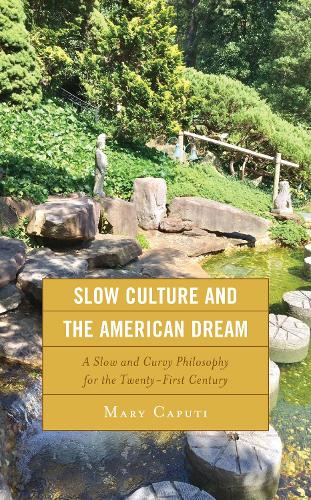
Slow Culture and the American Dream: A Slow and Curvy Philosophy for the Twenty-First Century
(Hardback)
Publishing Details
Slow Culture and the American Dream: A Slow and Curvy Philosophy for the Twenty-First Century
By (Author) Mary Caputi
Bloomsbury Publishing PLC
Lexington Books
1st June 2022
United States
Classifications
Professional and Scholarly
Non Fiction
Agriculture and farming
Cultural studies: customs and traditions
306.09730905
Physical Properties
Hardback
194
Width 160mm, Height 228mm, Spine 17mm
435g
Description
Is the USA hospitable to the slow movement The land of fast food, get-rich-quick schemes, and 24/7 news feeds In Slow Culture and the American Dream: A Slow and Curvy Philosophy for the Twenty-First Century, Mary Caputi argues that the slow movement has much to teach the United States at this moment in time. Although the philosophy of slow is in many ways at odds with the prevalent American Dream, the current setting demands that we heed its teachings. It is especially urgent that the climate crisis that makes us to rethink our fast-paced, ever-accelerating lifestyle so that we can lighten our carbon footprint and decelerate if not reverse the damage done to the planet. Equally important, however, is the movements mandate that we slow down and savor life, focusing on quality, beauty, and calm rather than quantity and speed. Slow Food, Cittaslow (slow cities), slow fashion, slow travel, and slow parenting are examples of a philosophy that seeks to shift our focus away from progress as currently understood and revalue quality-of-life issues. Drawing deeply on her involvement with Slow Food and Cittaslow, the author advocates mainstreaming the philosophy of slow and thus reprioritizing the American Dream in ways that sustain the planet and teach Americans to develop a more refined aesthetic principle.
Reviews
Speed kills. Facing our modern worlds addictions to capitalist efficiencies, speedy technologies, and fast food, Caputi here offers an alternative. Arguing for a slow and curvy politics, she draws on the slow food movement to diagnose and remedy our common predicament. How do we attend to one another, to our bodies, and to the health of the world around us By taking time time to taste, time to savor, time to learn. Engaging such diverse sources as Shakespeare, the antiwork movement, urban design, and Native American traditions, Caputis philosophy encourages a slower, greener, and more embedded life.
-- Kennan Ferguson, University of Wisconsin-MilwaukeeAuthor Bio
Mary Caputi is professor of political theory at California State University, Long Beach.
